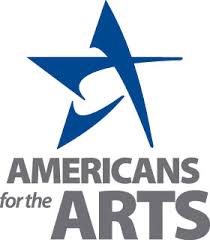AFTA on Cultural Equity
From Inga Vitolo, AFTA Press and Media Relations Manager —
 Americans for the Arts (AFTA), the nation’s leading nonprofit organization for advancing the arts and arts education, announces the release of a new statement on cultural equity. The effort was driven by the board of Americans for the Arts, compelled to re-commit the action, time, and resources toward cultural equity after field-wide engagement with changing demographics and changing habits of participation and consumption of the arts.
Americans for the Arts (AFTA), the nation’s leading nonprofit organization for advancing the arts and arts education, announces the release of a new statement on cultural equity. The effort was driven by the board of Americans for the Arts, compelled to re-commit the action, time, and resources toward cultural equity after field-wide engagement with changing demographics and changing habits of participation and consumption of the arts.
To support a full creative life for all, Americans for the Arts commits to championing policies and practices of cultural equity that empower a just, inclusive, equitable nation.
Americans for the Arts defines cultural equity as embodying the values, policies, and practices that ensure that all people—including but not limited to those who have been historically underrepresented based on race/ethnicity, age, ability, sexual orientation, gender, socioeconomic status, geography, citizenship status, or religion—are represented in the development of arts policy; the support of artists; the nurturing of accessible, thriving venues for expression; and the fair distribution of programmatic, financial, and informational resources. The new cultural equity statement sets a direction for Americans for the Arts’ work going forward.
“While our commitment to this core belief has never wavered, the political, social, and economic circumstances in which we carry out our mission are constantly evolving,” stated Robert L. Lynch, president and CEO of Americans for the Arts. “As the local arts field reacts to and anticipates change, all of us must recognize inequities and continuously work to find ways to achieve greater access to a full vibrant cultural life. True change is never a one and done deal; we can always do better.”
The revision of the cultural equity statement was created after surveying and speaking with more than 3,000 people over the past year on issues of cultural equity and the engagement of more than 150 commentators including staff, Americans for the Arts members, Americans for the Arts advisory council members, stakeholders in the arts field, and partners in the nonprofit sector. The organization’s first written commitment to diversity and equity was released in 1988 and refined in subsequent years.
Over Americans for the Arts’ 56-year history, programming has addressed diversity, equity, and inclusion. Notable programs include: partnerships with organizations such as The Association of American Cultures; providing program models for educating at-risk youth through the YouthArts Toolkit; creating Diversity in Arts Leadership, an intern program focused on increasing diversity in the nonprofit arts field; addressing important issues of social change through the Animating Democracy Initiative; cultivating leadership from new members in the nonprofit arts field through the Emerging Leaders program; as well as work on community cultural planning, public art, community development, and rural arts that aim to bring greater access to the arts for all the people.
Americans for the Arts is the leading nonprofit organization for advancing the arts and arts education in America. With offices in Washington, D.C. and New York City, it has a record of more than 50 years of service. Americans for the Arts is dedicated to representing and serving local communities and creating opportunities for every American to participate in and appreciate all forms of the arts.

